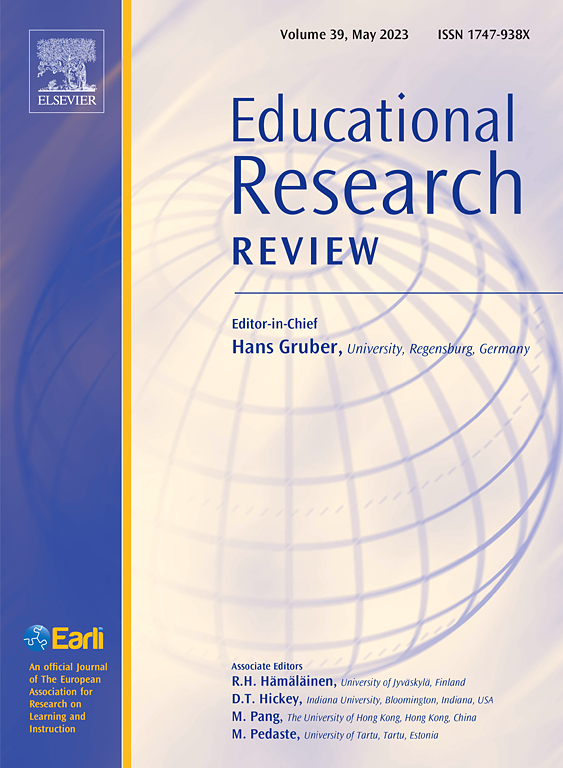成人低读写能力在字母正字法上的认知特征:与发展性阅读障碍的系统回顾与比较
IF 10.6
1区 教育学
Q1 EDUCATION & EDUCATIONAL RESEARCH
引用次数: 0
摘要
在现代社会中,处理文本是至关重要的。然而,并不是每个人都能在学校教育中获得足够的读写能力。本系统综述总结和综合了对字母书写系统中读写能力低下的成年人的研究,包括行为和神经生物学研究的结果,并将这些研究结果与发展性阅读障碍的研究结果进行了比较,因为发展性阅读障碍是成年期读写能力低下的一种可能解释。27项关注als认知概况的研究符合三个预定义的标准:阅读水平、年龄和教育程度。结果表明,脑萎缩症患者在技能和信息处理水平上的表现低于识字成人,在神经生物学水平上表现出结构和功能上的差异。与识字的成年人相比,als患者的认知特征更接近小学生。然而,相对于儿童而言,als的读写技能较少依赖于语音,更多依赖于正字法策略。对发展性阅读障碍的meta分析结果进行的叙述性比较显示,尽管不完全,但在认知概况上有很大的重叠。目前的研究结果有助于更好地了解als患者的读写技能和与阅读相关的认知功能,并可能支持针对als患者特定认知困难的量身定制干预措施的发展。本文章由计算机程序翻译,如有差异,请以英文原文为准。
The cognitive profile of adults with low literacy skills in alphabetic orthographies: A systematic review and comparison with developmental dyslexia
Dealing with text is crucial in modern societies. However, not everyone acquires sufficient literacy skills during school education. This systematic review summarizes and synthesizes research on adults with low literacy skills (ALLS) in alphabetic writing systems, includes results from behavioral and neurobiological studies, and compares these findings with those on developmental dyslexia given that this developmental disorder is one possible explanation for low literacy skills in adulthood. Twenty-seven studies focusing on the cognitive profile of ALLS met the three predefined criteria of reading level, age, and education. Results showed that ALLS performed worse than literate adults in various tasks at skill and information processing level, and exhibited structural and functional differences at the neurobiological level. The cognitive profile of ALLS was closer to that of primary school children than of literate adults. However, relative to children, ALLS’ literacy skills relied less on phonological and more on orthographic strategies. A narrative comparison of results with meta-analyses on developmental dyslexia showed large, though not complete, overlap in the cognitive profiles. The present results helps to better understand the literacy skills and reading-related cognitive functions of ALLS and may support the development of tailored interventions directed to the specific cognitive difficulties ALLS have.
求助全文
通过发布文献求助,成功后即可免费获取论文全文。
去求助
来源期刊

Educational Research Review
EDUCATION & EDUCATIONAL RESEARCH-
CiteScore
19.40
自引率
0.90%
发文量
53
审稿时长
57 days
期刊介绍:
Educational Research Review is an international journal catering to researchers and diverse agencies keen on reviewing studies and theoretical papers in education at any level. The journal welcomes high-quality articles that address educational research problems through a review approach, encompassing thematic or methodological reviews and meta-analyses. With an inclusive scope, the journal does not limit itself to any specific age range and invites articles across various settings where learning and education take place, such as schools, corporate training, and both formal and informal educational environments.
 求助内容:
求助内容: 应助结果提醒方式:
应助结果提醒方式:


